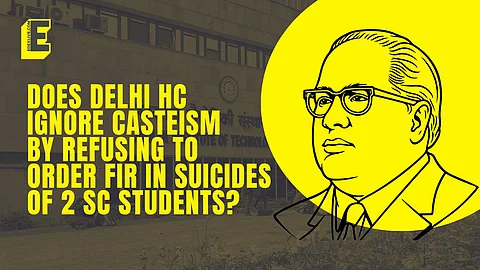

Saying that marks are not everything, the Delhi High Court on February 1, Thursday, urged the Indian Institutes of Technology (IIT) not to pressurise their students.
These statements were made by the court while quashing a plea seeking a first investigation report on the Indian Institute of Technology (IIT) Delhi by the parents of Ayush Ashna and Anil Kumar, two scheduled caste (SC) students of the institute who died by suicide last year.
Ayush Ashna, a final-year BTech student from IIT Delhi was discovered dead in his hostel room on July 9. Less than two months later, the administration of IIT Delhi received a mail on September 1, announcing the demise of Anil Kumar, another SC student, who was discovered hanging from the ceiling in his hotel room.
The students of both parents approached the Delhi High Court, alleging that their deaths were caused by the discrimination they faced at IIT Delhi owing to their caste locations and pleaded that an FIR be registered against the institution.
They also alleged that police officials investigating their deaths were “acting in connivance with the administration of IIT Delhi, and have deliberately followed delaying tactics so that all the evidence is systematically destroyed”, to save the real perpetrators.
To these accusations, Justice Rajnish Bhatnagar, who was hearing the case, pointed to how there was no evidence for the parents’ accusations, as neither Ayush nor Anil approached the SC/ST Cell or the police with complaints of being discriminated against.
Moreover, he mentioned the fact that both students had failed in multiple subjects before their demise and that they could have chosen to end their lives due to the pressure of performing well.
“This Court can understand the sentiments of the parents of the deceased and deeply discourages the growing trend of pressurising young minds to perform the best in every aspect of life leading them to take unfortunate steps,” Justice Bhatnagar noted.
He also stated that the Delhi High Court cannot issue a mandamus to have an FIR registered against IIT Delhi “on the basis of sympathy or sentiments”, thus, dismissing the parents’ petition.
Issue of caste discrimination ignored, students allege
A few students of IIT Delhi believe that by downplaying the allegations of the parents of Ayush and Anil, the Delhi High Court has reduced the very real consequences of caste discrimination to a more caste-agnostic mental health issue.
Noting that IIT Delhi already has student welfare bodies and counselling groups to help them cope with low grades, a student from the institute, on the condition of anonymity, says that they would not achieve much if IIT Delhi makes no changes to its institutional system itself to ensure that students don't face any pressure in the first place that they have to "withstand" – and ensuring that there is no caste discrimination, is one of these changes.
“If you ask a general category student if they have heard about or even faced caste discrimination during their time at IIT Delhi, they would say that no such thing exists in this day and age. Dalit, Bahujan, and Adivasi students would be able to recount at least 10 incidents,” they say.
They add that forms of discrimination include segregated seating arrangements for vegetarians, jokes and jabs on affirmative action policies and their beneficiaries, casting doubts on the intellect and capabilities of SC/ST/OBC category students, isolating them after finding out about their caste, and caste-based favouritism.
The scholar adds that these factors, coupled with the lack of a proper redressal mechanism for complaints of caste discrimination close out all avenues of relief or justice to students from oppressed communities.
Further, they point to the fact that IIT Delhi did not have an SC/ST/OBC Cell until last year and that the earlier mechanisms to redress caste discrimination were biased towards Savarna (upper caste) students and faculty.
“Imagine if the perpetrator is the favourite member of the members of the redressal body. Or imagine if your perpetrator occupies a powerful position in the institution. Even still, imagine if the is a part of the redressal committee. No SC/ST/OBC student would get a fair hearing,” they explain.
“The Delhi High Court verdict is nothing but a display of what transpires at IIT Delhi, but at a public platform,” the scholar adds.
In the meanwhile, the Office of the SC/ST/OBC Cell of IIT Delhi, which was constituted in March last year, was inaugurated today.
